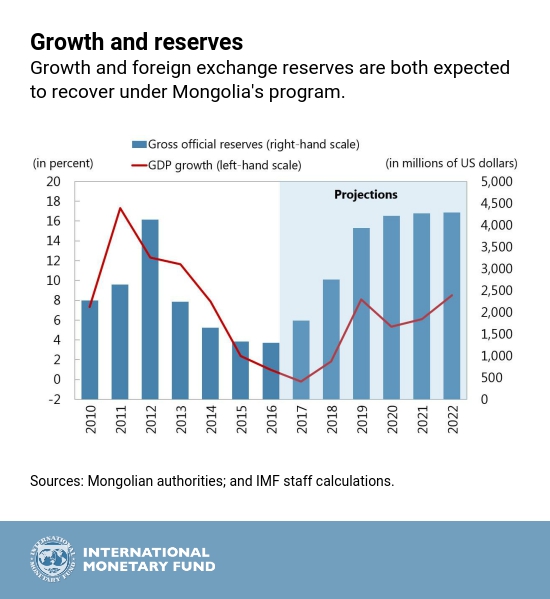
An employee looks at the Oyu Tolgoi mine in Mongolia's South Gobi region: mining is a key driver of the economy (photo: STAFF/REUTERS/Newscom)
Mongolia Turns the Corner with $5.5 Billion IMF-Led Financing Package
May 31, 2017
Rich in natural resources and once one of the world’s fastest-growing economies, Mongolia has faced hard times more recently because of the commodity price slump, slowing demand in key export markets, and past policy mistakes. But the country now has a chance to turn things around, as the government pushes much-needed reforms with IMF support.
Related Links
The IMF has approved a three-year, $434 million loan for Mongolia as part of a broader $5.5 billion financing package supported also by Japan, Korea, China, the World Bank, and the Asian Development Bank. In terms of GDP, this is the fourth-largest package in IMF history, underscoring the international community’s commitment to Mongolia’s economic success.
The program—under the Extended Fund Facility—supports the newly-elected government’s Economic Recovery Plan and focuses on building foreign exchange reserves, putting debt on a sustainable path, strengthening the banking sector, and securing stable, inclusive growth over the long run.
“The authorities have an ambitious program in front of them, but with their strong political backing and steadfast implementation, they can strengthen policies and implement critical structural reforms to stabilize the economy and make it more resilient to future shocks,” said IMF mission chief for Mongolia Koshy Mathai.

Fiscal consolidation is at the heart of the stabilization plan and, combined with donor concessional financing and continued engagement of Mongolia’s private creditors, can help restore debt sustainability. The fiscal balance will improve steadily, turning from a large deficit to a modest primary surplus by the early 2020s. This will be done in a balanced way, by focusing on reducing excessive expenditures and increasing revenues by moving to a progressive tax system and improving tax administration.

The fragile banking system will be strengthened through a special audit and recapitalization process, and the role of the Bank of Mongolia will be enhanced through upgrades to its governance, independence, and regulatory and supervisory framework.
Breaking the cycle
Over the longer term, the program focuses on policies to break the boom-bust cycle. A raft of structural fiscal measures help to bolster discipline at every stage of the budget process and fix the problems that derailed fiscal policy in the past. These include a new law to strengthen the independence and commercial orientation of the Development Bank of Mongolia, limits on the powers of the cabinet and of parliament to increase spending, improvements to the public investment program, a stronger framework for public-private partnerships, and a new fiscal council to provide independent views on the budget.
Protecting the poor
Although the poverty rate has fallen in recent years, it remains high at over 21 percent of the population and will likely increase with the recent economic downturn. A key part of the program is the strengthening of the social safety net, with benefits better targeted to the neediest. The IMF has worked closely with the Asian Development Bank and the World Bank in this area. In addition, the underfunded pension system is being strengthened.
Staying competitive
Finally, the program also focuses on boosting the economy’s competitiveness and fostering diversification to create jobs and achieve more inclusive growth. Sustainable mining will remain the bedrock of the economy, but with its 60 million livestock, Mongolia is also well positioned to develop its meat and dairy exports, as well as its already well-known cashmere sector.
Tourism is another area of substantial opportunity. Encouraging regional integration through better infrastructure will also stimulate new growth sources and deepen links with Mongolia’s dynamic neighbors.
Over the next few years, as major mines come into production, Mongolia could see a fundamental economic transformation. The IMF looks forward to being Mongolia’s partner along this journey.








